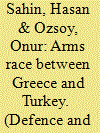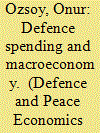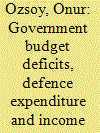| Srl | Item |
| 1 |
ID:
083235


|
|
|
|
|
| Publication |
2008.
|
| Summary/Abstract |
Two NATO allies, Greece and Turkey, have also been considered potential threats to each other. Thus, these countries' military spending has been subject to many academic studies to observe if these potential threats trigger the military spending of both countries. Nonetheless, most regression results of those studies did not find a significant result supporting the arms race between the two countries. The current study provides an additional empirical evaluation of military spending of both countries by using an annual data set running from 1958 to 2004. The study is in spirit of Smith et al. (2000) employing a Markov switching approach, but utilizing a longer period. A Markov switching approach allows estimation of military spending of each country if both sides compete with each other to have higher spending or if they behave independently of each other.
|
|
|
|
|
|
|
|
|
|
|
|
|
|
|
|
| 2 |
ID:
083234


|
|
|
|
|
| Publication |
2008.
|
| Summary/Abstract |
This study uses a six-variable vector autoregressive (VAR) model and analyses the relationship between defence spending as a percentage of GNP, government budget as a percentage of GNP, total deficit as a percentage of GNP, the GNP growth rates, inflation rates, and government budget deficit as a percentage of GNP for the case of Turkey from 1933 to 2004. The impulse response functions (IRFs) are also derived and Granger causalities among the variables estimated. The results support the short-run causality between defence spending and economic growth.
|
|
|
|
|
|
|
|
|
|
|
|
|
|
|
|
| 3 |
ID:
083227


|
|
|
|
|
| Publication |
2008.
|
| Summary/Abstract |
This paper analyzes the relationship between government budget deficits, defence expenditure and income redistribution among different social-income groups in Turkey for the period 1965-2003. The analysis was based on a five-equation vector auto regressive (VAR) model and impulse response functions (IRFs) derived from the VAR model. The study finds that the deficit as a percentage of GNP has a negative and significant impact on transfer payments as a percentage of GNP. The IRFs indicate that shocks to deficit expenditures as a percentage of GNP (DEFGNP) have statistically significant impacts on defence spending as a percentage of GNP (DSGNP), educational expenditures as a percentage of GNP (EDGNP), health expenditures as a percentage of GNP (HEGNP), and transfer payments as a percentage of GNP (TPGNP). The results derived from this study also indicate that there is a positive and significant relationship between defence spending as a percentage of GNP and deficits as a percentage of GNP. Therefore, defence spending is viewed as a tool for transferring income among different social-income groups and across generations in Turkey for the period 1965-2004. As a result of this, the government can use deficit and defence spending as one of the major instruments to transfer income among different social-income groups and across generations in Turkey.
|
|
|
|
|
|
|
|
|
|
|
|
|
|
|
|